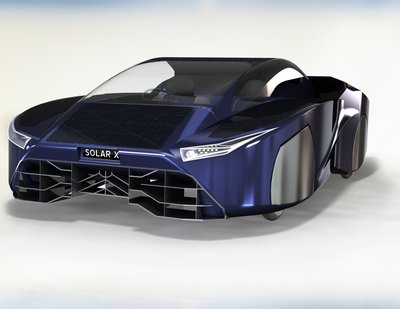Solar-electric hybrid sports car for Australia
A collaboration between Swinburne University, Aurora Vehicle Association and SolarX Corporation has set out to create Australia’s first road legal solar-electric hybrid sports car. The project arose when the Aurora Vehicle Association, a non-profit group promoting sustainable mobility, sought to produce a commercially viable, street legal, two-seat sports car to demonstrate the capabilities of solar power.
According to Swinburne Product Design Engineering senior lecturer Dr Clint Steele, Aurora approached Swinburne to use the talent of the undergraduate engineering students. While Swinburne’s students have brought their mechanical engineering knowledge, Aurora is providing expertise in automotive exterior and interior styling, aerospace engineering, electrical engineering, automotive engineering, vehicle dynamics, vehicle testing and public outreach.

Dr Steele said the car will be powered by solar and electric battery energy, eliminating the reliance on fossil fuels and making it a zero-emissions vehicle. Hub motors will be built into the rear wheels and the batteries are topped up via solar panels, he explained.
“The car will be able to drive at any speed limit in Australia,” said Dr Steele. “As long as the sun is shining, the car can keep going … It has the ability to make drivers completely independent, so they don’t need to rely on service stations.”
Dr Steele said the challenges associated with moving from a concept to producing a car that is commercially viable are in the refinement stages. Not only does the car have to be strong and lightweight, “We also need to make the car look good and still have the aerodynamics that we require,” he said.
SolarX Corporation is the collaborative enterprise’s commercial arm, set up to work alongside Aurora and Swinburne. The company’s CEO, Barry Nguyen, said the project has international potential.
“There are many countries around the world with unresolved pollution problems crying out for innovative solutions,” Nguyen said.
“This project will prove that zero emission cars are a realistic mode of sustainable transportation, reducing the burden on the environment.”
Nguyen said the car will be available for limited production. It will also serve as a public platform to showcase technologies for potential licensing to other companies, as “the intellectual property that we develop in these circumstances has the potential to be applied in other areas”, he said.
Can we really 'electrify everything'?
Energy experts have debated the practicality of achieving full electrification on a global or...
Councils collectively save on energy
Thirteen regional New South Wales councils have pooled their resources to make the shift to...
From coal to clean: accelerating Asia's renewable energy transition
As Asia faces mounting climate challenges and rising energy demands, the push to shift from coal...







